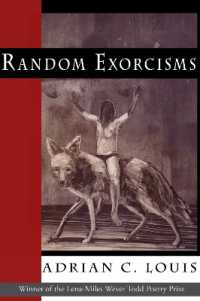- ホーム
- > 洋書
- > ドイツ書
- > Humanities, Arts & Music
- > History
- > middle ages
Description
Via three exemplary chapters the authors present the results of the DFG-funded research project entitled 'Man Rent or Land Rent? Significance and function of land transfer for the practice of lordship of kings, lay lords and ecclesiastics in northeast Scotland in the late Middle Ages'. This volume tried to offer a modified perspective on the organisation of the political society in late Medieval Scotland, formed through the bottom-up view of regional lordship and its respective sources. Scottish history should not only be told from the perspective of crown, magnates and the sources produced by and for them but bottom-up: There are large enough quantities of mostly underused sources stemming from clerical institutions, nobility and the burghs, which can further enhance our knowledge of the political structure and the socio-economic composition of the kingdom. The Practice of Lordship and the Political Culture in Late Medieval Scotland Via three exemplary chapters the authors present the results of the DFG-funded research project entitled 'Man Rent or Land Rent? Significance and function of land transfer for the practice of lordship of kings, lay lords and ecclesiastics in north-east Scotland in the later Middle Ages'. This volume tried to offer a modified perspective on the organisation of the political society in late Medieval Scotland, formed through the bottom-up view of regional lordship and its respective sources. Scottish history should not only be told from the perspective of crown, magnates and the sources produced by and for them but bottom-up: There are large enough quantities of mostly underused sources stemming from clerical institutions, nobility and the burghs, which can further enhance our knowledge of the political structure and the socio-economic composition of the kingdom. Jörg Rogge teaches as a professor Medieval History at the Johannes Gutenberg University Mainz. His research interests include the social and cultural conditions of the socialisation of fighters and warriors in medieval Europe from a comparative perspective. Matthias Berlandi is a postdoctoral research assistant at the Georg August University Göttingen. Sebastian Weil is a postdoctoral research assistant at the University Kassel.








